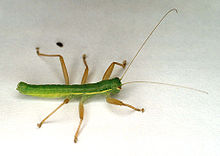Mantophasmatidae
The insect family Mantophasmatidae is the sole family in its order. It is a group of African carnivorous insects discovered in 2002.[1] The most common vernacular name for this order is gladiators, but it is not well known under any name.
| Gladiators Temporal range: Jurassic–Recent
| |
|---|---|

| |
| Mantophasma zephyra | |
| Scientific classification | |
| Kingdom: | |
| Phylum: | |
| Class: | |
| Subclass: | |
| Infraclass: | |
| Superorder: | |
| Order: | Notoptera
|
| Suborder: | Mantophasmatodea
|
| Family: | Mantophasmatidae
|
Their modern centre of endemism is western South Africa and Namibia, although a relict population and Eocene fossils suggest a wider ancient distribution.
Members of the order are wingless even as adults, making them relatively difficult to identify. They resemble a mix between praying mantids and phasmids. Molecular evidence indicates that they are most closely related to a family known as the Grylloblattidae.[2]
The mantophasmids were originally described from old museum specimens that found in Namibia (Mantophasma zephyra) and Tanzania (M. subsolana), and from a 45-million-year-old specimen of Baltic amber (Raptophasma kerneggeri).
The most recent classification recognizes numerous genera, including fossils.[3]
References
change- ↑ Primack, Richard B. (2006). Essentials of conservation biology (4th ed.). Sinauer Associates, Inc. p. 62. ISBN 978-0-87893-720-2.
- ↑ Cameron S.L; Barker S.C. & Whiting M.F. (2006). "Mitochondrial genomics and the new insect order Mantophasmatodea". Molecular Phylogenetics and Evolution. 38 (1): 274–279. doi:10.1016/j.ympev.2005.09.020. PMID 16321547.
{{cite journal}}: CS1 maint: multiple names: authors list (link) - ↑ Arill, A. & M. Engel 2006. Rock crawlers in Baltic amber (Notoptera: Mantophasmatodea). American Museum Novitates 3539:1-10[1] Archived 2008-12-17 at the Wayback Machine